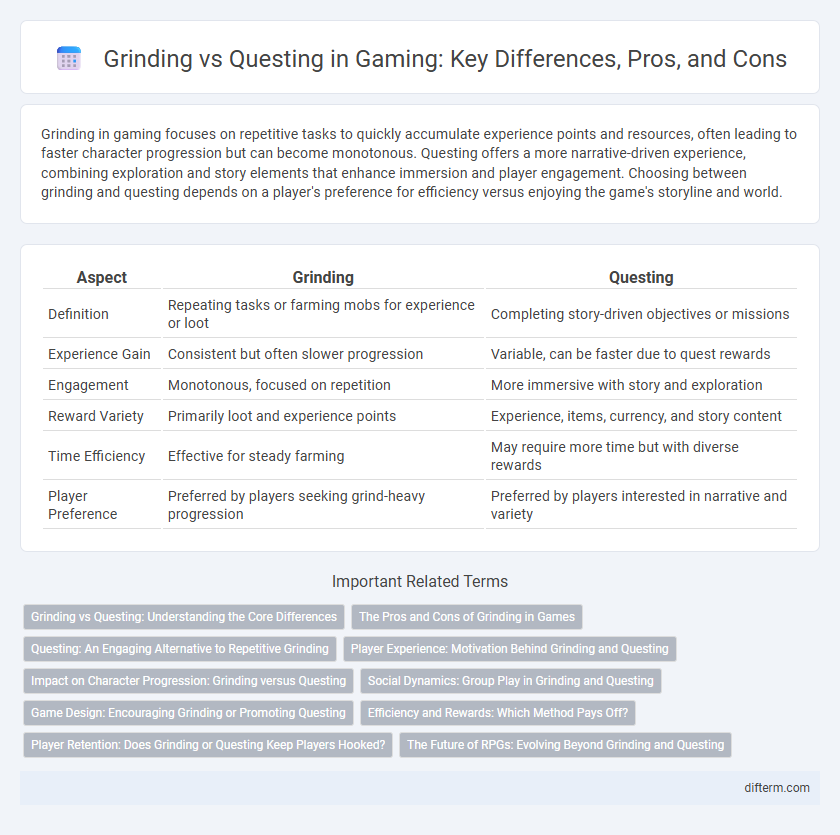Grinding in gaming focuses on repetitive tasks to quickly accumulate experience points and resources, often leading to faster character progression but can become monotonous. Questing offers a more narrative-driven experience, combining exploration and story elements that enhance immersion and player engagement. Choosing between grinding and questing depends on a player's preference for efficiency versus enjoying the game's storyline and world.
Table of Comparison
| Aspect | Grinding | Questing |
|---|---|---|
| Definition | Repeating tasks or farming mobs for experience or loot | Completing story-driven objectives or missions |
| Experience Gain | Consistent but often slower progression | Variable, can be faster due to quest rewards |
| Engagement | Monotonous, focused on repetition | More immersive with story and exploration |
| Reward Variety | Primarily loot and experience points | Experience, items, currency, and story content |
| Time Efficiency | Effective for steady farming | May require more time but with diverse rewards |
| Player Preference | Preferred by players seeking grind-heavy progression | Preferred by players interested in narrative and variety |
Grinding vs Questing: Understanding the Core Differences
Grinding in gaming involves repetitive actions targeting experience and loot accumulation, often requiring minimal strategy and fostering efficiency over engagement. Questing emphasizes narrative-driven objectives and diverse challenges, promoting exploration and story immersion while offering structured progression. Understanding the core differences helps players choose between fast skill advancement and a richer, more varied gameplay experience.
The Pros and Cons of Grinding in Games
Grinding in games offers consistent experience gains and predictable rewards, making it ideal for players aiming to level up quickly or gather specific resources. However, it often leads to repetitive gameplay that can reduce player engagement and increase burnout risk. This method contrasts with questing, which provides narrative depth and varied challenges but may yield less efficient progression.
Questing: An Engaging Alternative to Repetitive Grinding
Questing offers a dynamic and immersive gameplay experience by integrating rich narratives and diverse objectives, enhancing player engagement beyond repetitive grinding. It provides structured progression through story-driven missions, rewarding players with unique items, character development, and world exploration. This approach fosters a more satisfying and varied gaming journey, appealing to gamers who prefer meaningful challenges over monotonous task repetition.
Player Experience: Motivation Behind Grinding and Questing
Grinding often appeals to players driven by a desire for steady progression and tangible rewards, providing a consistent feedback loop that reinforces motivation. Questing immerses players in narrative-driven objectives, enhancing engagement through story depth and varied challenges. The motivation behind grinding centers on efficiency and skill mastery, while questing fulfills a player's need for exploration and contextual achievement.
Impact on Character Progression: Grinding versus Questing
Grinding in gaming offers steady character progression through repetitive tasks that yield consistent experience points and resources, enhancing skills and leveling up efficiently. Questing provides varied challenges and narrative-driven objectives, often granting unique rewards and broader story immersion, which can lead to more versatile character development. Balancing grinding with questing optimizes progression by combining reliable experience gain with diverse skill acquisition and valuable loot.
Social Dynamics: Group Play in Grinding and Questing
Grinding in gaming often fosters strong social dynamics by encouraging repetitive, cooperative group play to achieve shared goals, enhancing team coordination and camaraderie. Questing, on the other hand, promotes diverse social interactions through varied objectives and narrative-driven tasks, facilitating role specialization and strategic collaboration within player groups. Both grinding and questing contribute uniquely to social engagement in multiplayer environments, shaping community building and player retention.
Game Design: Encouraging Grinding or Promoting Questing
Game design strategically balances grinding and questing to enhance player engagement and retention by integrating reward systems that align with gameplay style preferences. Grinding often involves repetitive tasks with incremental rewards, fostering skill mastery and resource accumulation, while questing offers narrative-driven challenges that promote exploration and story immersion. Effective game design leverages these mechanics to create a dynamic progression system that satisfies both achievement-oriented players and those motivated by immersive experiences.
Efficiency and Rewards: Which Method Pays Off?
Grinding offers consistent experience points and resource accumulation through repetitive actions, maximizing efficiency for leveling up in a shorter time frame. Questing provides diverse rewards, including unique items, story progression, and skill enhancements that grinding typically cannot match. Players seeking rapid advancement prioritize grinding, while those aiming for comprehensive game completion value questing for its richer, multifaceted returns.
Player Retention: Does Grinding or Questing Keep Players Hooked?
Grinding offers repetitive, skill-based challenges that foster mastery and long-term engagement, appealing to players who enjoy incremental progress and routine. Questing provides narrative-driven goals and varied objectives, maintaining player interest through storytelling and diverse gameplay experiences. Player retention often depends on a balance, as grinding satisfies perseverance-oriented gamers while questing captivates those motivated by exploration and achievement.
The Future of RPGs: Evolving Beyond Grinding and Questing
Emerging RPGs are shifting focus from traditional grinding and questing toward immersive storytelling and player-driven narratives. Procedural generation and AI-driven quests create dynamic worlds that adapt to player choices, reducing repetitive gameplay. This evolution emphasizes meaningful progression, blending exploration with personalized challenges to enhance engagement and replayability.
grinding vs questing Infographic

 difterm.com
difterm.com